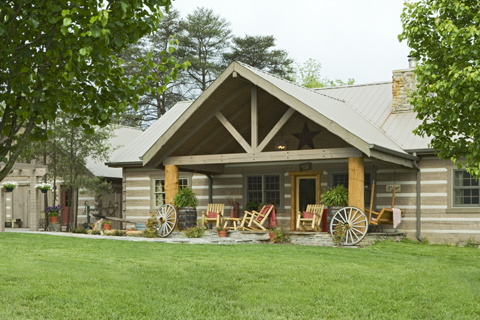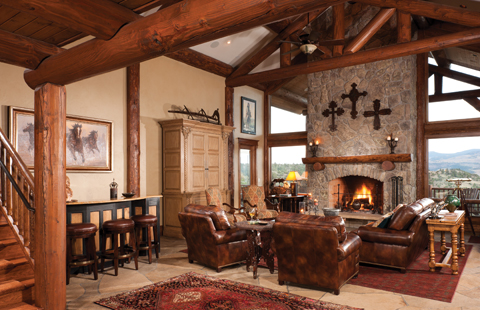Building that perfect log or timber home is a process that many people pursue only once or twice in a lifetime, so the benefit of personal experience is often rare. Considering the first major step, which is the comparison of quotes from qualified log and timber companies, advice from experienced professionals is pure gold.
“The most important thing going in is to determine what you want and need,” assesses Mathew Sterchi, vice president of sales and marketing at StoneMill Log & Timber Homes in Knoxville, Tennessee. “Then, finding a company that can satisfy those wants and needs is the logical next step. Sometimes people are just getting a materials package without the rest of the program. When the logs are delivered, somebody has to put the house together.”
Sterchi has seen situations that developed without the proper forethought and planning. These can cause needless delays, cost overruns, and frustration during a time that should be productive and exciting.
“Put together a checklist before you go shopping for a package,” he advises. “That way you can determine pretty quickly whether a company is a good fit for you. Not every company and every buyer are a good fit for one another.”
Speaking of the comprehensive quote, it is tough to compare the proverbial apple to an orange. Watch for subtle differences, and take the time to understand what should be included in a log or timber home construction quote. Subtle differences mean dollars and time.
“Every manufacturer supplies a different level of completeness,” relates Joe Folker, president and owner of Timberhaven Log Homes in Lewisburg, Pennsylvania. “It’s important to remember that anything not supplied by the log home company will need to be supplied from another source. So don’t judge the manufacturer based on price alone. Compare apples to apples, and you will often see that the price coincides with the completeness of the package.”
Evaluate the content of the quote. Does it include anything beyond the delivery of the logs or timber? Other basic elements of a comprehensive quote include doors, windows, hardware, and fixtures. Necessary services encompass design and architecture, construction documentation such as blueprints, engineering, compliance with local codes and permitting, installation of appliances and fixtures, on-site construction management, and more. Further, within each of these elements are nuances that must be handled, such as the level of detail required in a set of plans or blueprints. Do they need an architect’s certification and stamp?
Then there are the variations in the materials themselves. All logs or timbers are not created equal. “On log homes, are the logs handcrafted or milled?” asks Stephanie Johnson of PFB Custom Home Group. “There is a big price difference between the two. The diameter of the logs is something people often neglect to consider. A home built with 12-inch-diameter logs is going to cost more than one with 8-inch logs. The log system can affect the cost, and of course you should understand the real materials you are comparing: authentic logs, laminated, or just siding with a conventional wall inside.”

Appalachian Log Homes/photo by Roger Wade Studio
Those seeking a timber home package would do well to look at several other components. “Again, the dimensions of the timber are important,” Johnson notes. “Complexity is hard for people to grasp, but one great room could have a wide variety of frames designed for it—one with ornate accents and lots of pieces with curved elements—while another might just have posts and a few simple king trusses. More timber frame companies tend to offer an enclosure system along with their timbers, so it is important to know if that is something you want.”
According to Folker, it is critical for a buyer to understand the three most important elements of a materials quote. “Quality, quantity, and services,” he offers. “These elements should be easily understandable in a detailed quote. Don’t settle for vague terms to describe what you will receive for material. Take the time to sit down and review the quote with the producer’s representative so they can clarify anything you might not understand before you make a final decision. They are happy to do it so you can make an educated decision and feel confident in the choice.”
When a buyer steps off down the road to ownership of a log or timber home, it helps to evaluate the project in total. Developing a budget is key, including the cost of the land, site preparation, landscaping, interior finishes such as cabinets, furnishings, and fixtures, and construction of the structure itself.
“A lot of people will find one plan on a company’s website that is for 2,500 square feet, then go to another company and think that another plan of the same size should cost a similar amount,” Johnson adds. “So many factors affect the cost of materials and the final turn-key cost that a simple size comparison is usually not valid. Keep in mind that the materials themselves are only a portion of the total cost to build.
Every buyer should be thinking in terms of turnkey cost to build and then see how the materials fit into that equation.”
“For one house,” she concludes, “the materials might be a quarter of the total cost to build, while for
another they may be closer to half. There is no magic cost per square foot or percentage of a home price that fits every situation. Complexity, density, size, and many other factors have to be considered.”
Weighing options, thinking a project through with a perspective on which elements are “musts” and which would be “nice to have,” establishing a budget, and then interviewing several potential candidates for a log or timber home package provider will help a buyer move ahead with confidence. Preparation and realistic expectations help comparisons of various quotes to come into focus.
Then, choosing the right company will make all the difference in the successful outcome of the project. The results will be worth the effort, making the most of the opportunity to own the log or timber home of a lifetime.

